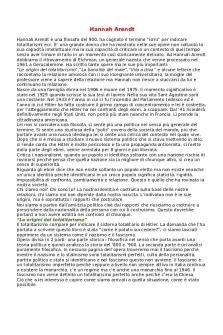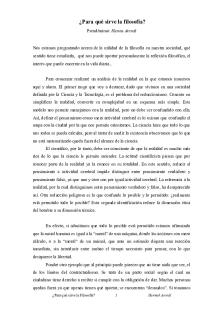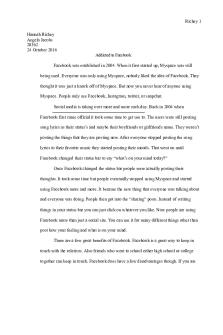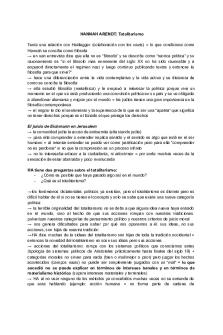Hannah Adrent summaries PDF

| Title | Hannah Adrent summaries |
|---|---|
| Author | kyri |
| Course | Philosophy of Law |
| Institution | New York University |
| Pages | 4 |
| File Size | 102.5 KB |
| File Type | |
| Total Downloads | 63 |
| Total Views | 147 |
Summary
Hannah Arendt text...
Description
Adrent, Origins of Totalitarianism (4/5/21)
Part 2: “The Perplexities of the Rights of Man” within Chapter 9 Gradesaver: For Arendt, the situation of the stateless is a symptom of the failure of the Rights of Man. These rights were supposed to be inalienable, and yet they were unable to protect those stateless persons who were not citizens of a sovereign state. Therefore, Arendt concludes that it is the loss of community, not the loss of rights, which comes first. This is rather peculiar, given how the Rights of Man were originally defined. In the 18th century when they were codified by the American and French revolutions, the "Rights of Man" were described as “inalienable” and coming from nature— “natural rights.” But Arendt argues that, in the 20th century, man has become alienated not only from history but from nature itself. This means that neither nature nor history can serve as the basis for humanity's existence. Because humanity tries to absolutely dominate both nature and the supposedly natural "laws" of its own history, neither nature nor history can serve as an external "guarantee" of the "Rights of Man." Now, it is humanity itself that must guarantee these rights; but, after the events of the two World Wars, Arendt is not sure that this is possible. Because of the deterioration of society and the violence that followed, Arendt thinks that history has proved that humanity cannot enforce the Rights of Man itself. This conclusion confirms the argument of Burke, who claimed that the French Revolution was too radical, and that "Rights of Man" were not possible, but only the Rights of Englishmen, or the Rights of Frenchmen. Humanity itself is too abstract and cannot act as the basis for rights. Since neither nature nor history can serve as the basis for rights, the nation or the community, according to Burke, is the only thing left that can uphold rights. The further irony of the stateless person is that when he is cast out of his community and loses his rights he becomes, for the first time, a human “in general.” Thus, the plight of the stateless becomes more than a mere refugee crisis: if the destruction of states at large were to take place and humanity were to be “generalized” into one international community of the stateless, this might consist of people living in the “conditions of savages,” which is to say that the generalization of humanity under a totalitarian regime might return humanity to a more animallike state: barbarism.
Part 3: Chapter 10, Chapter 13 Gradesaver Ch. 10-11 With all the historical pieces in place, Arendt finally begins her analysis of totalitarianism itself. She begins with the more well-known aspect of totalitarianism, the totalitarian leaders, who are characterized by their fame and its curious impermanence. Arendt chalks this up to the fickleness of the masses that totalitarian movements harness and what she calls the “motionmania” of the movement itself. A totalitarian movement is only animated by its constant motion, and the fanaticized members identify completely with this movement. As soon as the movement stops, it becomes completely irrelevant to those who once followed it in mass. The totalitarian movement aims to organize the masses, and in fact totalitarian rule is only possible in countries with a large superfluous mass. According to Arendt, two “illusions” of
democracy were revealed by the totalitarian movements’ organization of the masses (312). First, it showed that the majority of people did not take part in government, and that a minority is actually actively controlling politics. Second, it showed that, contrary to popular belief, the masses were neither neutral nor inconsequential and could be harnessed for the furtherance of totalitarian ideologies. Totalitarian movements seemed to rise to power through democratic means before dissolving democracy itself. But Arendt argues that this was not merely a "mistake" on the part of the masses. According to Arendt, it was the result of the breakdown of the class system in Europe. When large swathes of the population became superfluous and unable to participate in labor, they were effectively ejected from class society and turned into the classless “masses.” The breakdown of the class system also meant the breakdown of the party system, since parties had represented class interests in the preceding half-century. The masses grew out of a highly atomized society. When men were torn from their relations with other men, they became atomized and isolated individuals that constituted a “mass” rather than a society or a body politic. The psychology of the mass man was characterized on the one hand by a self-centeredness—each man was filled with bitterness that they were at the center of a massive injustice—and on the other by a selflessness—that each individual did not matter but was only an instrument for the furtherance of the ideology with which they identified. Arendt uses a comparison of the Nazis to the Bolsheviks to show the importance of the atomization of masses to totalitarian movements and regimes. While atomization had already occurred in the case of Nazi Germany, Stalin had to create a mass of atomized individuals in order to destroy Lenin’s revolutionary leadership and change it into totalitarian rule (318). Once power passed from the Soviets to the bureaucracy, Stalin was able to create these conditions by liquidating classes and introducing the Stakhanov system, which isolated and atomized the workers by altering the actual work process. The elite also played an important role in this process. The “front generation” of intellectuals who had experienced the first World War had adopted a generally anti-liberal attitude and were attracted to the way the mob destroyed respectability and seemed to reveal the sickness of the status quo. Totalitarian movements also claimed to abolish the separation of public and private life. Though it has often been wrongly assumed that totalitarian movements only appeal to the poor masses, Arendt shows that the elite were also attracted to totalitarianism and the mob. Gradesaver, Ch. 12-13 There is a question that still plagues Arendt. Is totalitarianism a form of modern government, or is it a new form of politics itself? To answer this question, she begins by discussing the totalitarian conception of the law. Totalitarianism seems to have broken with the common law of man, but rather than replacing that with its own common law, it claims to be the purveyor of Natural and Historical law and identifies law with man. Whereas for positive law, Nature and History are sources of stability and authority, for totalitarianism they are the movement itself and thus all laws are laws of the movement.
The purpose of terror is to realize the law of movement. This means, paradoxically, that terror stabilizes or freezes men into inaction, so that the rules and laws of nature and history can move freely, unhindered by human spontaneity. This has perversely solved a problem of political thought. Since government is based on lawfulness and is therefore supposed to be stable and unchanging, how does one account for and deal with the movement of the body politic and its citizens? In the completed totalitarian government, all men become One Man, and terror ensures the continuation of the movement such that all actions become the acceleration of the movement of history and nature. Even so, as long as totalitarianism does not rule the earth, terror itself is not enough to inspire and guide human action. Even fear cannot be a guiding force, since terror is arbitrary, and fear cannot help a man act in order to avoid his fear. Totalitarianism needs ideology to fit men into the role of both executioner and victim so that they can be guided to accelerate the motion of history. Ideology is the tool that accomplishes this task. According to Arendt, ideologies are not concerned with being, but with becoming. There are three characteristics of all ideological thinking that Arendt argues have been proven by the totalitarian transformation of ideologies. First, they claim total explanation of a process, of what becomes, and are always oriented towards history. Second, ideological thinking is independent of all experience and is unable to learn from experience. This second element allows it to claim to be “truer” than reality and construct a world of fiction. Third, ideologies have no power to transform reality. An ideology starts from an axiom, or premise--for example, that all history is the history of the development of race--and deduces the laws of motion of history from it. According to Arendt, this logical consistency doesn't exist in reality. The world itself is not actually created by a strictly logical process that has a single, correct starting point. In order for ideologies to change reality, they must be able to understand reality, but their dogmatic belief in a single first principle that can explain all of history and nature makes it impossible for them to actually understand the world. This characteristic of ideologies amounts to complete dedication and submission to the socalled logic of history. Since all people exist only as a tool to the continuation of the logical movement of history--to what Arendt calls "becoming"--all freedom is crushed. Freedom is the ability to begin, the ability to move between men, contingency and individualism. All of these phrases used by Arendt to describe freedom can seem mystifying, but they are all an attempt to refer to the real spontaneity of people in the practical world. A "beginning" could be as simple as the birth of a new person. A beginning is, most importantly, something completely different from what has come before it. Furthermore, a beginning is not determined by what has come before it. In a story, for example, the beginning is a fresh start. When a story starts with action that is later explained by earlier events, we say that a story begins in media res, in the middle of thing. It literally is not a beginning the same way "Once upon a time..." can lead almost any ridiculous situation. This spontaneity is maintained by preserving individuality in society. This can be done by preserving the ability to experience and think, both of which totalitarianism attempt to stamp out. Men lose the ability to experience and think when they are disconnected completely from other men, when they are completely atomized. When there is no public life, there is also no private
life. Atomized men, though "alone" in a sense, are not individuals; they are rather tools in a historical process. Arendt notes that this description seems similar to the conditions of people when they are laboring, because in that situation they often do not actively "cooperate" with others in the sense of negotiating collective actions. Rather, they simply co-participate in an abstract process of production. This condition also shares some similarities with tyranny, where a tyrant creates society according to a blueprint of how it should look. But for Arendt, what distinguishes the atomization caused by totalitarianism from that caused by labor—in which one leaves one's public life temporarily—or that of tyranny—where one cannot act politically— is how totalizing it is. This distinguishes the common ground of totalitarianism—loneliness— from mere isolation. Loneliness is not only being unable to act with other men, but also being completely cut off from and abandoned by them. Loneliness is connected to the superfluousness of men in modern society, because someone who has been abandoned completely by their community is superfluous to that community. Since loneliness is present in even non-totalitarian societies, totalitarianism must be taken seriously as a potential threat to the whole world. Totalitarianism, should it succeed, would mean the destruction of humanity as such. But Arendt still feels that the beginning of a new generation could bring hope for overcoming the problem of totalitarianism. Because new people are always being born, it is always possible that new ideas and new chances for freedom might also enter the world....
Similar Free PDFs

Hannah Adrent summaries
- 4 Pages

Hannah Arendt - resumen libro
- 2 Pages

Hannah Arendt riassunto storia
- 6 Pages

JOT2 Task1 Hannah Ingraham
- 7 Pages

Hannah arendt - asdfg
- 4 Pages

We refugees – Hannah Arendt
- 4 Pages

Case Summaries
- 52 Pages

Paradigm Summaries
- 3 Pages

1 - Summaries
- 20 Pages

OBG - hannah cooke obgyn notes
- 102 Pages

Hannah V Peel case summary
- 1 Pages
Popular Institutions
- Tinajero National High School - Annex
- Politeknik Caltex Riau
- Yokohama City University
- SGT University
- University of Al-Qadisiyah
- Divine Word College of Vigan
- Techniek College Rotterdam
- Universidade de Santiago
- Universiti Teknologi MARA Cawangan Johor Kampus Pasir Gudang
- Poltekkes Kemenkes Yogyakarta
- Baguio City National High School
- Colegio san marcos
- preparatoria uno
- Centro de Bachillerato Tecnológico Industrial y de Servicios No. 107
- Dalian Maritime University
- Quang Trung Secondary School
- Colegio Tecnológico en Informática
- Corporación Regional de Educación Superior
- Grupo CEDVA
- Dar Al Uloom University
- Centro de Estudios Preuniversitarios de la Universidad Nacional de Ingeniería
- 上智大学
- Aakash International School, Nuna Majara
- San Felipe Neri Catholic School
- Kang Chiao International School - New Taipei City
- Misamis Occidental National High School
- Institución Educativa Escuela Normal Juan Ladrilleros
- Kolehiyo ng Pantukan
- Batanes State College
- Instituto Continental
- Sekolah Menengah Kejuruan Kesehatan Kaltara (Tarakan)
- Colegio de La Inmaculada Concepcion - Cebu




